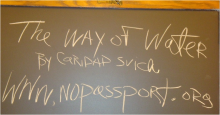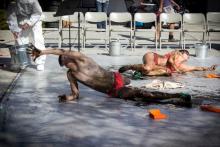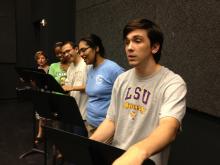On The Way of Water
By Melanie Driscoll
Director of Bird Conservation, Gulf Coast Conservation
National Audubon Society
August 12, 2012
I was asked to be part of a panel following a reading of Caridad Svich’s play The Way of Water at The Red Shoes in Baton Rouge, Louisiana. The request came because, as National Audubon Society’s director of bird conservation in Louisiana during the Deepwater Horizon oil disaster, I initiated and helped lead Audubon’s science, volunteer, and communications response to the disaster. And I continue today to work on a team to protect, steward and support our Gulf Coast birds that suffered during the 2010 disaster. I was glad for an opportunity to see this play and to discuss it, both to help people understand more about the current situation in the Gulf, but also because it would provide me with a chance for personal reflection and for catharsis.
As a community and as a nation, we still have a need for deep healing from the Deepwater Horizon oil disaster. The healing will take a long time, perhaps years, perhaps decades. For some, it will never come. Some are lost already – birds, dolphins, oysters, marsh grasses, acres, people. Many resources of the Gulf were injured, and the responsible parties and the government are working out settlements for payment for that which was damaged, lost, or killed outright. It will be years, decades, perhaps longer, until the true toll is known, until humans can look back and try to tally the true cost. Even as humans assess the damage – to human health, to cultural integrity, to the environment, to our natural resources, there are damages that remain intangible, about which we rarely even speak.
For our sense of fairness as a nation was violated. And Congress used their power to restore some of that sense of fairness, by passing the RESTORE Act, which will return 80% of Clean Water Act fines on every gallon of oil spilled to the Gulf Coast for restoration. Most Americans believed that fine for damages in the Gulf should be returned to the Gulf, and countless people contacted their legislators to advocate for that outcome. In some small measure, a sense of fairness is also being restored.
But we have lost even more in the Gulf Coast states, particularly for those who live on the Gulf, fish in her marshes, swim in her waters, and feed their families and their souls on her air, her waters, her sounds and her creatures. We have lost our sense of safety. Following a disaster of any kind, social structures disintegrate. Families lose critical support, and social ills, in the form of abuse, neglect, poverty, chemical dependency, and suicide rise sharply. Following a manmade disaster, communities that rely on the responsible parties, but hold anger toward them, turn on themselves and each other. We have lost our sense of trust, in the ecosystem that supports us, in each other, and ultimately, for some, in ourselves.
The Way of Water speaks of the human tragedy unfolding along the Gulf Coast. Media attention peaked and began to decline even before most birds drowning in oil were rescued, before most bloated dolphins were found dead on our shores. National media will revisit the coast from April 10th until April 20th each year, allowing the world to vicariously relive the horror, but to reassure them that life goes on. And it does, for many. But the stories of the people, the families, the communities, have barely been told. The Way of Water eloquently shows the love people of the Gulf have for family, for their personal history, for their waters and their home. It shows how strongly they are tied to place, in a world that is otherwise mobile and often disconnected from place. It makes us aware of what has been lost, and what is in jeopardy. The play is beautiful, stark, and often harsh, much like a landscape that has been made frightening for those who once were rocked gently by its waves.
During our panel discussion after the reading, an audience member asked if I was an optimist. I do not know. I do know this; I believe in resilience. I believe in the resilience of the warm Gulf waters, the marsh grasses that spring to life from any newly formed land, the birds that return undaunted, though not unharmed, to nest on islands obliterated by hurricanes and fouled by toxic oil. But I also recognize fragility. Ecosystems right themselves, unless the assault they face is too great. Bodies heal themselves, bird populations rebound, communities come together. But there is a threshold beyond which hurt cannot be healed, in bodies, populations, communities, ecosystems. I work hopefully, supporting at-risk bird populations to help them recover from recent losses. I am grateful for the work of others, like panelist Marylee Orr, who support the fishers and other families who are trying to recover from the assault on their health. And I take heart from the work of Caridad Svich, who is trying to keep the needs of our Gulf and her residents in the hearts of people around the world. With enough time, enough support, and the right resources, perhaps that healing will come, on so many levels. Perhaps that hope makes me an optimist.



